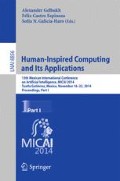Abstract
Online communities are filled with comments of loyal readers or first-time viewers, that are constantly creating and sharing information at an unprecedented level, resulting in millions of messages containing opinions, ideas, needs and beliefs of Internet users. Therefore, businesses companies are very interested in finding influential users and encouraging them to create positive influence. Influential users represent users with the ability to influence individual’s attitudes in a desired way with relative frequency. We present an empirical analysis on influential users identification problem in Twitter. Our proposed approach considers that the influential level of users can be detected by considering its communication patterns, by means of particular writing style features as well as behavioral features. Performed experiments on more that 7000 users profiles, indicate that it is possible to automatically identify influential users among the members of a social networking community, and also it obtains competitive results against several state-of-the-art methods.
This work was partially supported by CONACyT México Project Grant CB-2010/153315, and SEP-PROMEP UAM-PTC-380/48510349. We also thank to UAM Unidad Cuajimalpa and SNI-CONACyT for their support.
Access this chapter
Tax calculation will be finalised at checkout
Purchases are for personal use only
Preview
Unable to display preview. Download preview PDF.
References
Amigó, E., Carrillo-de-Albornoz, J., Chugur, I., Corujo, A., Gonzalo, J., Meij, E., de Rijke, M., Spina, D.: Overview of repLab 2014: Author profiling and reputation dimensions for online reputation management. In: Kanoulas, E., Lupu, M., Clough, P., Sanderson, M., Hall, M., Hanbury, A., Toms, E. (eds.) CLEF 2014. LNCS, vol. 8685, pp. 307–322. Springer, Heidelberg (2014)
Cha, M., Haddadi, H., Benevenuto, F., Gummadi, K.P.: Measuring User Influence in Twitter: The Million Follower Fallacy. In: Proceedings of the 4th International AAAI Conference on Weblogs and Social Media (ICWSM), Washington DC, USA, May 2010. AAAI Press, Menlo Park (2010)
Chakravarthy, S., Prasad, G.V.B.: The impact of opinion leader on consumer decision making process. International Journal of Management and Business Studies 1(3), 61–64 (2011)
Stephen, R.: Garner. Weka: The waikato environment for knowledge analysis. In: Proc. of the New Zealand Computer Science Research Students Conference, pp. 57–64 (1995)
Hastie, T., Tibshirani, R., Friedman, J.: The Elements of Statistical Learning: Data Mining, Inference, and Prediction. Springer (2009)
Horrigan, J.: Online communities: Networks that nurture long-distance relationships and local ties. PEW Internet and Family Life Project, Washington, DC (2001)
Huffaker, D.: Dimensions of leadership and social influence in online communities. Human Communication Research 36(4), 593–617 (2010)
Kong, S., Feng, L.: A tweet-centric approach for topic-specific author ranking in micro-blog. In: Tang, J., King, I., Chen, L., Wang, J. (eds.) ADMA 2011, Part I. LNCS, vol. 7120, pp. 138–151. Springer, Heidelberg (2011)
Kong, S., Feng, L.: A tweet-centric approach for topic-specific author ranking in micro-blog. In: ADMA (1), pp. 138–151 (2011)
Liu, D., Wu, Q., Han, W.: Measuring micro-blogging user influence based on user-tweet interaction model. In: Tan, Y., Shi, Y., Mo, H. (eds.) ICSI 2013, Part II. LNCS, vol. 7929, pp. 146–153. Springer, Heidelberg (2013)
Ma, N., Liu, Y.: Superedgerank algorithm and its application in identifying opinion leader of online public opinion supernetwork. Expert Systems with Applications 41(4, pt 1), 1357–1368 (2014)
Page, L., Brin, S., Motwani, R., Winograd, T.: The pagerank citation ranking: Bringing order to the web. Technical Report 1999-66, Stanford InfoLab (November 1999)
Afrasiabi Rad, A., Benyoucef, M.: Towards detecting influential users in social networks. In: Babin, G., Stanoevska-Slabeva, K., Kropf, P. (eds.) MCETECH 2011. LNBIP, vol. 78, pp. 227–240. Springer, Heidelberg (2011)
Trusov, M., Bodapati, A.V., Bucklin, R.E.: Determining influential users in internet social networks. Journal of Marketing Research XLVII, 643–658 (2010)
Author information
Authors and Affiliations
Editor information
Editors and Affiliations
Rights and permissions
Copyright information
© 2014 Springer International Publishing Switzerland
About this paper
Cite this paper
Ramírez-de-la-Rosa, G., Villatoro-Tello, E., Jiménez-Salazar, H., Sánchez-Sánchez, C. (2014). Towards Automatic Detection of User Influence in Twitter by Means of Stylistic and Behavioral Features. In: Gelbukh, A., Espinoza, F.C., Galicia-Haro, S.N. (eds) Human-Inspired Computing and Its Applications. MICAI 2014. Lecture Notes in Computer Science(), vol 8856. Springer, Cham. https://doi.org/10.1007/978-3-319-13647-9_23
Download citation
DOI: https://doi.org/10.1007/978-3-319-13647-9_23
Publisher Name: Springer, Cham
Print ISBN: 978-3-319-13646-2
Online ISBN: 978-3-319-13647-9
eBook Packages: Computer ScienceComputer Science (R0)

